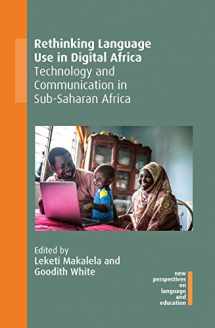
Rethinking Language Use in Digital Africa: Technology and Communication in Sub-Saharan Africa (New Perspectives on Language and Education, 92)
Book details
Summary
Description
Review
This is a timely and welcome addition to the burgeoning body of scholarship on language and communication in times of crises. It draws our attention to the importance of digital literacies and e-learning platforms in the communication of critical health information in marginalised multilingual communities. Measured in its aspirations yet far-reaching in policy implications, this volume deserves a space on the bookshelf of any serious scholar or student of applied and educational linguistics. ― Finex Ndhlovu, University of New England, Australia
Makalela and White have assembled a timely and powerful volume that addresses the global reliance on digital communication. The multimodal studies from Sub-Saharan Africa illustrate the disrupting power of technology to break down linguistic borders around African languages imposed by colonization, and to empower speakers to translanguage and create connections across the diaspora. ― Tatyana Kleyn, The City College of New York, CUNY, USA
This book breaks new ground in addressing how African languages and cultures are influenced and changed in digital communication. It explores multilingual practices in digital spaces and the use of digital technologies for performing arts. This is a must-read for anyone interested in digital communication in Africa and the diaspora. ― Felix K. Ameka, Leiden University Centre for Linguistics, The Netherlands
Theoretically and through its research examples Rethinking Language Use in Digital Africa is of value not just to students of language and society in Africa but to researchers interested in the theory and practice of digital communication and the study of minority languages around the world. -- Michael Carrier, Highdale Consulting, UK ― Training, Language and Culture, Volume 5 Issue 3, 2021
This book challenges the view that digital communication in Africa is limited and relatively unsophisticated and questions the assumption that digital communication has a damaging effect on indigenous African languages. The book applies the principles of Digital African Multilingualism (DAM) in which there are no rigid boundaries between languages. The book charts a way forward for African languages where greater attention is paid to what speakers do with the languages rather than what the languages look like, and offers several models for language policy and planning based on horizontal and user-based multilingualism. The chapters demonstrate how digital communication is being used to form and sustain communication in many kinds of online groups, including for political activism and creating poetry, and offer a paradigm of language merging online that provides a practical blueprint for the decolonization of African languages through digital platforms.


We would LOVE it if you could help us and other readers by reviewing the book
Book review



